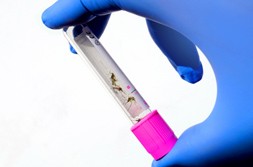Genetically Modified Mosquitoes Cut Rate of Viral Disease

By Lacey Cirinelli
It’s no secret that mosquitos carry disease. Both Dengue fever and the Zika virus can be transmitted through Aedes aegypti mosquito bites. But now we’re learning that A. aegypti mosquitos may actually reduce instances of viral disease thanks to genetic engineering.
While male mosquitos thrive on nectar, female mosquitos require protein from animal blood to produce eggs. If a female mosquito bites a human infected with a virus like Dengue or Zika, she becomes infected with the disease and can transmit it to the next human she bites. Dengue virus is considered the most important mosquito-spread disease because of its rapidly growing incidence.
Dengue fever, which has no cure or vaccine, is characterized by high fever, headache, skin rash and occasionally fatal bleeding. Zika virus, on the other hand, often presents without symptoms but is linked to serious neurological disorders and birth defects. The most severe Zika-related birth defect is microcephaly, which causes infants to have abnormally small heads, often leading to seizures, developmental delays and death. Because of the potentially severe implications of mosquito-borne diseases, developing new ways to control mosquito populations has become a key research focus.
Mutant Mosquitos
Traditional attempts at limiting mosquito-borne disease try to reduce mosquito populations through the use of pesticides, trapping and the removal of still water. However, Oxitec, a biotech company in Abingdon, England, has created genetically modified (GM) A. aegypti mosquitos that have an impaired ability to reproduce. These GM mosquitos need the antibiotic tetracycline to develop beyond adolescence. GM males given tetracycline have the ability to breed as usual, but the larvae produced die before they are mature enough to bite. After a few days, both mature mosquitos and offspring are dead, reducing the size of the next generation of mosquitos.
In 2015, Oxitec mosquitos were released into the CECAP/Eldorado area of Piracicaba, Brazil, which had the city’s highest rates of Dengue fever in 2014 and 2015. After one year, CECAP/Eldorado’s Dengue fever rate dropped by 91 percent, compared to the rest of the city’s 52 percent drop. Similar trials conducted in the Cayman Islands, Malaysia and Panama reported 75 to 90 percent reductions in A. aegypti populations.
While this is only the first study to definitively link GM mosquitos to reduced rates of disease, it’s giving researchers hope that mosquito-borne viruses may have finally met their match.
CLASSROOM DISCUSSION
- How does reducing the mosquito population impact diseases like Dengue and Zika?
- What negative side effects could result from GM mosquitos in the wild?
VOCABULARY
- Aedes aegypti mosquitos
- Dengue Fever
- Genetic Engineering
- Genetically modified organisms
- Microcephaly
- Zika virus

